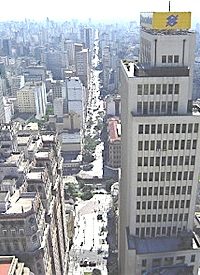
With the discovery of huge oil fields off the coast of Brazil in the fall of 2007 came estimates of just what impact they would have on Brazil’s already booming economy. Prior to the discovery of “pre-salt” reserves estimated to be the size of Florida and in excess of 120 billion barrels, Brazil’s economy was already considered to be the 7th largest in the world, according to the International Monetary Fund (IMF), the World Bank, and the CIA.
But as the resources are developed, to many observers Brazil is a cinch to take over 6th place by replacing Great Britain in the size of its economy. It’s economy in 2004 was one-third that of Great Britain’s but by 2007 it had grown to half. With the great recession costing the United Kingdom 20 percent of its GDP between 2007 and 2010, and Brazil’s continuing to grow apace by nearly 52 percent, the IMF now estimates that Brazil will take over 6th place by the end of this year.
The technological challenges facing Petrobas, Brazil’s main oil producer, are immense. In order to reach the oil, it will have to drill through four miles of ocean and rocks and a thick layer of salt. And then retrieving it and turning it into a profitable revenue stream will be the next challenge. Brazil’s politicians are already calling it “the pot of gold at the bottom of the ocean” and are considering how the revenues might be used to further the government’s endless list of priorities. Brazil already produces enough oil to be self-sufficient and, along with soybeans, iron ore, automobiles, aircraft and steel, it is a major exporter to China and the United States. But with the development of the Tupi and Carioca-Sugar Loaf fields, Brazil could become the third-largest exporter of oil in the world as well, producing as much as all the Middle East countries put together.
The country’s 192 million people have only recently begun to enjoy a higher standard of living. The number living below the poverty level has declined sharply over the past two decades to under 16 percent, and unemployment is only 5.7 percent. In 1995, 15 percent of Brazilian school children did not go to school. By 2005 the percentage had fallen to just three percent.
But the welfare state in Brazil is alive and well, with entitlement programs growing faster than the economy and the number of civil servants (whose jobs are protected by the constitution) has risen to a massive 70,000 just since 2002. Brazil’s government “sucks up almost twice the share of GDP that Mexico’s does,” according to The Economist. And “money is spent on pensions rather than building the roads and ports that would make it richer,” says The Economist. “The public sector is so large and the poorer states so over-represented in congress that trying to change any of this can appear impossible.”
Despite all of that, the country’s economy is booming, and the potential from development of its newly discovered oil resources will only add to its momentum. Unless the politicians decide to nationalize those deposits and discourage their full development, it appears that Brazil will have no problem exceeding Great Britain’s output and replacing it as the 6th largest economy in the world.
Photo: São João Avenue, one of São Paulo, Brazil’s most important commercial centers.



